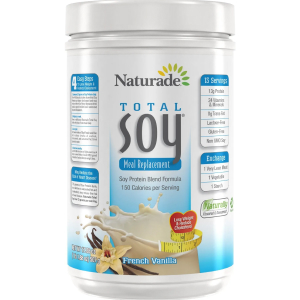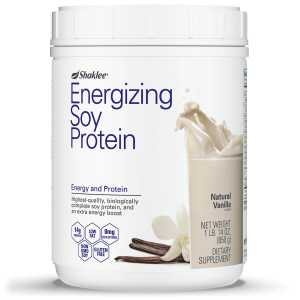 Expert's opinion
Expert's opinion
The article is a subjective view on this topic written by writers specializing in medical writing.
It may reflect on a personal journey surrounding struggles with an illness or medical condition, involve product comparisons, diet considerations, or other health-related opinions.
Although the view is entirely that of the writer, it is based on academic experiences and scientific research they have conducted; it is fact-checked by a team of degreed medical experts, and validated by sources attached to the article.
The numbers in parenthesis (1,2,3) will take you to clickable links to related scientific papers.
Best Soy Protein Powders 2024: Top Brand Reviews & Buyer’s Guide
All articles are produced independently. When you click our links for purchasing products, we earn an affiliate commission. Learn more about how we earn revenue by reading our advertise disclaimer.
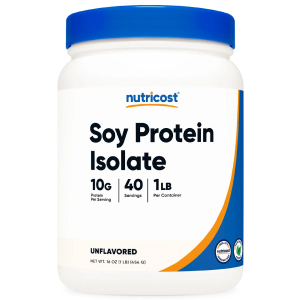
Nutricost Soy Protein Isolate
- Third-party tested.
- Non-GMO, gluten-free.
- Good Manufacturing Practice compliant.
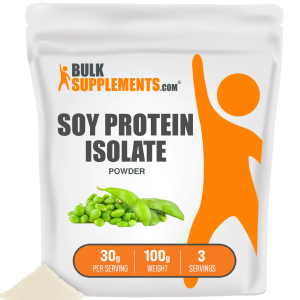
BulkSupplements Soy Protein Isolate Powder
- 90% protein by weight.
- No added sugars, gluten, or gluten additives.
- Only one ingredient, soy protein isolate.
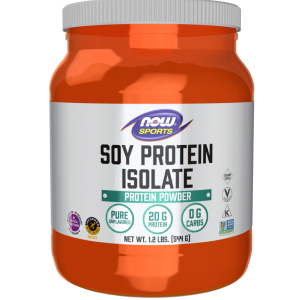
NOW Soy Protein Isolate Powder
- Non-GMO, Kosher, no artificial sweeteners.
- Informed sport certified.
- Low in sodium with zero carbs.
Protein powders are quite popular among athletes or regular gym-goers; in the past, the only options were animal-based protein powders or eating high-protein meals. There are now a variety of choices.
You can now buy plant-based protein that can also help support your workout goals, muscle recovery, and muscle growth, just like a whey protein powder. The similarities between soy and whey protein are that they both have all nine essential amino acids making them complete proteins.
Still, soy protein is an excellent alternative to whey as a protein source. Now you can obtain the best soy protein powder supplements with various ingredients and flavors, with no need for unflavored supplements anymore.
Best Soy Protein Powders On The Market In (May. 2024)
- Nutricost Soy Protein Isolate – Editor’s Choice
- Bulksupplements Soy Protein Isolate Powder – Most Natural
- NOW Soy Protein Isolate Powder – Best For Sports
- Naturade Total Soy Weight Loss Shake – Best For Weight Loss
- Shaklee Energizing Soy Protein – Most Transparent
5 Best Soy Protein Powders To Buy In 2024
Nutricost Soy Protein Isolate
Nutricost is a simple protein powder that is plant-based, vegetarian-friendly, and made from isolated soy protein.
- Third-party tested.
- Non-GMO, gluten-free.
- Good Manufacturing Practice compliant.
- Contains sucralose.
- Doesn’t contain fiber or added nutrients of any significance.
Nutricost’s Soy Protein Isolate is an easily digestible protein with a 94-95% higher digestibility[1] when compared to kidney beans and lentils.
It comes in one-pound or two-pound options; you can buy it in unflavored, vanilla, or chocolate flavor for a flavorful protein shake.
Nutricost is our Editor’s Choice for setting itself apart from other soy protein powders by being third-party tested, made with ingredients free from genetically modified organisms or non-GMO, and gluten-free. It contains only 10 grams of protein per serving.
An ideal choice for anyone looking for a boost in protein but follows a balanced diet and already obtains most of their protein from food. It’s, however, sweetened with sucralose, an artificial sweetener recently found to alter the gut microbiome[2] and may adversely affect sugar metabolism.
The recommended dosage is not visible in the product photos, but the serving size is about 13 grams or one scoop. You may have to decide how much protein intake you want to consume based on your activity level and age. You can consume this with water, cow’s milk, soy milk, or any milk alternative.
You can make a one-time purchase or subscribe and save. There’s a 60-day money-back guarantee.
BulkSupplements Soy Protein Isolate Powder
BulkSupplements provides a naturally isolated soy protein that helps increase lean muscle mass while supporting muscle recovery and endurance.
- 90% protein by weight.
- No added sugars, gluten, or gluten additives.
- Only one ingredient, soy protein isolate.
- The bag may not close properly.
- The imperial system of dosage differs in label and website.
- High in sodium.
For a simple soy protein shake, BulkSupplements offers a plant-based powder that is gluten-free, has no additives, has no added sugars, has no yeast, and is lactose-free. The type of protein[3] is soy isolate, which is ideal for vegetarians and vegans.
BulkSupplements soy isolate protein powder is unflavored and can be combined with any beverage to make a protein shake. Consuming it with water keeps the sugar intake low and can help control blood sugar levels. It has 405 milligrams of sodium per serving, which is considered a high amount considering the daily amount should not exceed 2,300 mg.[4]
The recommended dosage is 27 grams of protein per serving or four tablespoons. On the product label, the serving size is four tablespoons, and on the website, the supplement facts section indicates five tablespoons. Weighing the powder on a calibrated gram scale will get you an accurate 30-gram serving size.
You can make a one-time purchase or subscribe and save. You get a 30-day money-back guarantee if you return unopened products.
NOW SPORTS Soy Protein Isolate Powder
A good vegetable source of quality protein with a complete amino acid profile from soy protein isolate.
- Non-GMO, Kosher, no artificial sweeteners.
- Informed sport certified.
- Low in sodium with zero carbs.
- Not for weight loss.
NOW® supplement brand has various protein supplement options; if you are looking for a soy protein isolate powder, they have it. It’s also Non-GMO, Kosher, with no artificial sweeteners. For athletes, it’s also an informed sport-certified product.
Other important features are that this soy protein powder is corn-free, dairy-free, egg-free, and nut-free, and the NOW® supplement brand closely adheres to current Good Manufacturing Practices for facilities.
This soy protein powder is unflavored and has zero grams of carbohydrates. On the label, the NOW® supplement brand indicates the following “ From the FDA:[5] Diets low in saturated fat and cholesterol that include 25 grams of soy protein a day may reduce the risk of heart disease.”
The recommended dosage is one serving of one-third cup or 24 grams with eight ounces of water, milk, or any other beverage; stir or blend. The website indicates that one serving of soy protein isolate contains 20 grams of protein and 90 calories. It should not be used as a meal replacement or for weight reduction per the manufacturer.
Naturade Total Soy Weight Loss Shake
A vanilla-flavored soy protein powder that can be used as a meal replacement that is naturally sweetened. As the best soy protein powder for weight loss, it’s better than skipping meals.
- It can replace a meal.
- It may promote weight loss.
- Contains 24 vitamins and minerals.
- Comes in only a 13-day supply.
- Contains 15 grams of fructose sugar.
- Contains maltodextrin.
Naturade’s Total Soy protein is a meal replacement vegan protein powder. It can be exchanged for one very lean meat, one vegetable, and one starch. Its purported health benefits may reduce the risk of heart disease and reduce cholesterol levels.
The supplement contains 150 calories, no fiber, and only 13 grams of protein per serving, with low nutrient levels despite the added 24 vitamins and minerals.
Yet, the protein supplement can provide some satiety and some key nutrients helping it to promote weight loss.[6]
Soy protein powder is a common allergen and is avoided by those allergic to it. Per the label, it’s also made in a facility that processes other allergens like milk, eggs, and wheat, so cross-contamination is possible.
Naturade Total Soy protein powder is naturally sweetened with 15 grams of fructose sugar and contains maltodextrin from partially broken-down corn or wheat.
Fructose intake is associated with higher cardiovascular mortality,[7] increased triglycerides, increased insulin resistance, and the development of metabolic disorders. Maltodextrin is a highly processed food additive[8] associated with gut dysbiosis and may adversely affect digestive health.
The recommended dosage is 39 grams or two scoops with eight ounces of water or any beverage. You get a 30-day money-back guarantee if the product is returned unopened.
Shaklee Energizing Soy Protein
A low-fat, plant-based, high-quality soy protein powder that contains complete protein to support lean muscle growth.
- Non-GMO, Kosher.
- Helps with bone, breast, heart, and prostate health.
- Free from artificial flavors, colors, sweeteners, or preservatives.
- Not made to lose weight.
- Has 8-9 grams of added sugar.
Shaklee’s Energizing Soy Protein powder is non-GMO, naturally low in fat, and has all nine amino acids. Because it’s plant-based, it’s naturally lactose and cholesterol-free; you can also find five essential B vitamins, calcium that meets at least half of the daily value, and soy isoflavones that help support bone health, as well as heart, breast, and prostate health.
This product is produced in factories where peanuts, tree nuts, milk, egg, wheat, and fish are processed, so cross-contamination is possible.
A unique feature of Shaklee’s Energizing Soy Protein is that its soybeans are produced under an Identity Preservation Program. The soybeans are strictly monitored and controlled from the planting process and through processing.
The recommended dosage is 28 grams or three tablespoons, and mix with a glass of milk, juice, water, or your favorite beverage; adding fruit to the blend is optional. It has 110 calories, 14 grams of protein, and eight supplemental nutrients (not including sodium).
There isn’t a money-back guarantee date mentioned in the return policy; it indicates they will accept returns for a refund. You must contact the company for further details on returning the product.
What Is Soy Protein?
Soy protein is obtained from the soybean, a native to East Asia and commonly used in Asian countries as a complete protein source. It’s known to have many health benefits and is lactose-free, low in fat, and cholesterol free.
Soy can lower overall low-density lipoprotein cholesterol (the bad cholesterol) and reduce the risk of developing breast cancer[9] or developing reoccurrence of breast cancer while boosting bone health.
Health Benefits Of Soy Protein Powders
Protein powders were originally made from regular cow’s milk protein; these would have complete protein for tissue repair and synthesis. Also, the milk-based protein would have a high digestibility.
In the last few years, as athletes and consumers have started to eat a more plant-based diet, the demand for plant-based protein supplements has increased, and the industry has supplied the demand.
Now you can access various plant-based proteins, protein bars, protein shakes, and many other plant-based products. Most of these protein-derived plant-based products are sourced from peas, brown rice, flaxseed, pumpkin seeds, hemp, or chia seeds. These products must often be blended with other complementary plant sources to make an amino acid profile that provides a complete protein.
In contrast, a soy-based protein powder will have an amino acid profile that is a complete protein. The quality is similar to cow’s milk.[10]
Soy proteins often add claims on their labels that consuming their soy protein powder can help reduce the risk for cardiovascular disease[11] or lower LDL cholesterol levels, a claim currently sanctioned by the Food and Drug Administration.
Side Effects Of Soy Protein Powders
Like any dietary supplement, there may be some side effects from its use. The first one, an allergic reaction, is a possibility. Soy is one of the most common allergens; it’s possible to not know you have an allergy to soy until you start a soy-based protein powder.
Common side effects of soy protein powder use are either constipation or diarrhea. How your body may react is unknown, and side effects can vary. Therefore, you may want to watch the return policy if you have a sensitive stomach.
Thyroid Function
Soy protein powder may affect thyroid function[1] if a person is low in iodine; therefore, a physician consult would be advisable if you suspect thyroid function issues or know that you are low in iodine.
Pregnancy
During pregnancy, limiting consumption to one to two servings of soy per day is generally recommended. In breastfeeding, little is known about its effects.
Cancer
Women with breast cancer or at risk of developing breast cancer can consume soy foods, and research has shown that such consumption may prevent the reoccurrence of breast cancer.[12]
Soy Options
Therefore, in the case of people that cannot take soy protein and still want a vegetarian protein option, the best soy-free protein powder should simply be a combination of plant proteins to equal a complete protein profile.
Options include combinations of pea protein powder, chickpeas, lentils, and rice, yielding a profile of all needed amino acids. Hemp is a complete protein like soy, but more research is needed on its quality. Because most plant-based protein sources lack all essential amino acids, combining plant proteins can provide the body with the limiting amino acids.
It’s important to realize that consuming a healthy and balanced diet will always be better than supplementing with dietary supplements.
Buying The Best Soy Protein Powder – Buyer’s Guide
The best reason to buy soy protein is that they are excellent protein powder for vegans, vegetarians, and people with religious restrictions or intolerances to dairy products. Buying the best soy protein powders will depend on ingredients and price.
Third-Party Testing
Manufacturing companies of dietary supplements are not required to do third-party testing, but many do. Investing in third-party testing can help identify ingredient accuracy, potency, heavy metals, bacteria, pesticides, herbicides, filth, and mold.
Third-party testing is not associated with the supplement company, although some companies do their lab testing. The United States Pharmacopoeia, ConsumerLabs, and National Sanitation Foundation are the most popular third-party testing labs.
Choosing a third-party tested supplement increases your chances of obtaining one that includes the ingredients it claims and is free from harmful components.
How do you know your product is third-party tested? Easy; the product label will disclose it, or it’s easily visible on the product’s website.
Ingredient Quality
The protein content is important; protein formulations that include the branched-chain amino acids leucine, isoleucine, valine, and other essential and non-essential amino acids are high-quality protein sources. Most labels will disclose the amino acid profile and the milligrams per serving, making it possible to know the protein content.
Things you don’t want in your plant-based protein supplement are artificial additives, flavors, an artificial sweetener, dairy, or a product that includes allergens if you have allergies.
Price
The price range of the reviewed soy protein supplements is between $19.96-$47.05. The price difference can be related to the quality of the soy protein used by the manufacturer and any additional nutrients included.
Final Thought
Protein supplementation is now possible with plant-based options, making sure that if this is your option, you choose supplements with complete proteins.
The best way to obtain protein is through a balanced diet with fresh foods, and these supplements should be considered only after consulting with your physician.
Frequently Asked Questions
You can lower overall LDL cholesterol levels, lower the risk of developing breast cancer, and possibly positively affect bone health.
They are not usually meant for weight gain; they are mostly bought and used for muscle growth or recovery.
It depends on your specific reason for purchasing a protein supplement.
They are not intended to lose weight, but some brands do carry protein products to help lose weight.
Yes, soy proteins are complete proteins, as is hemp. Other plant-based proteins are blended to make an amino acid profile that makes it a complete protein.
Women who have had breast cancer or are at risk of developing breast cancer can consume soy foods, and recent research suggests soy may prevent breast cancer reoccurrence.[12]
Consuming soy greater than what is consumed in one to two servings a day may affect the fetus because of the estrogen-like substances found in soy.
The most common side effects of soy protein powder use are either constipation or diarrhea.
+ 12 sources
Health Canal avoids using tertiary references. We have strict sourcing guidelines and rely on peer-reviewed studies, academic researches from medical associations and institutions. To ensure the accuracy of articles in Health Canal, you can read more about the editorial process here
- Kumar, M., Tomar, M., Punia, S., Dhakane-Lad, J., Dhumal, S., Changan, S., Senapathy, M., Berwal, M.K., Sampathrajan, V., Sayed, A.A.S., Chandran, D., Pandiselvam, R., Rais, N., Mahato, D.K., Udikeri, S.S., Satankar, V., Anitha, T., Reetu, Radha and Singh, S. (2022). Plant-based proteins and their multifaceted industrial applications. LWT, [online] 154, p.112620. doi:https://doi.org/10.1016/j.lwt.2021.112620.
- Suez, J., Cohen, Y., Valdés-Mas, R., Mor, U., Dori-Bachash, M., Federici, S., Zmora, N., Leshem, A., Heinemann, M., Linevsky, R., Zur, M., Ben-Zeev Brik, R., Bukimer, A., Eliyahu-Miller, S., Metz, A., Fischbein, R., Sharov, O., Malitsky, S., Itkin, M. and Stettner, N. (2022). Personalized microbiome-driven effects of non-nutritive sweeteners on human glucose tolerance. Cell, [online] 185(18), pp.3307-3328.e19. doi:https://doi.org/10.1016/j.cell.2022.07.016.
- Chua, J.-Y. and Liu, S.-Q. (2019). Soy whey: More than just wastewater from tofu and soy protein isolate industry. Trends in Food Science & Technology, [online] 91, pp.24–32. doi:https://doi.org/10.1016/j.tifs.2019.06.016.
- Center (2022). Sodium in Your Diet. [online] U.S. Food and Drug Administration. Available at: https://www.fda.gov/food/nutrition-education-resources-materials/sodium-your-diet.
- Center (2023). Structure/Function and Related Claims in Dietary Supplement Labeling. [online] U.S. Food and Drug Administration. Available at: https://www.fda.gov/food/information-industry-dietary-supplements/notifications-structurefunction-and-related-claims-dietary-supplement-labeling.
- Min, J., Kim, S.-Y., Shin, I.-S., Park, Y.-B. and Lim, Y.-W. (2021). The Effect of Meal Replacement on Weight Loss According to Calorie-Restriction Type and Proportion of Energy Intake: A Systematic Review and Meta-Analysis of Randomized Controlled Trials. Journal of the Academy of Nutrition and Dietetics, [online] 121(8), pp.1551-1564.e3. doi:https://doi.org/10.1016/j.jand.2021.05.001.
- Busnatu, S.-S., Salmen, T., Pana, M.-A., Rizzo, M., Stallone, T., Papanas, N., Popovic, D., Tanasescu, D., Serban, D. and Stoian, A.P. (2022). The Role of Fructose as a Cardiovascular Risk Factor: An Update. Metabolites, [online] 12(1), p.67. doi:https://doi.org/10.3390/metabo12010067.
- Arnold, A.R. and Chassaing, B. (2019). Maltodextrin, Modern Stressor of the Intestinal Environment. Cellular and Molecular Gastroenterology and Hepatology, [online] 7(2), pp.475–476. doi:https://doi.org/10.1016/j.jcmgh.2018.09.014.
- NCCIH. (2016). Soy. [online] Available at: https://www.nccih.nih.gov/health/soy.
- Rizzo, G. and Baroni, L. (2018). Soy, Soy Foods and Their Role in Vegetarian Diets. Nutrients, [online] 10(1), p.43. doi:https://doi.org/10.3390/nu10010043.
- Center (2022). FDA Statement Soy Protein and Coronary Heart Disease Health Claim. [online] U.S. Food and Drug Administration. Available at: https://www.fda.gov/food/food-labeling-nutrition/fda-statement-regarding-soy-protein-and-coronary-heart-disease-health-claim-review.
- Nutrition and Cancer. (2022). Association of Fermented Products with Risk of Cancer Recurrence and Mortality among Breast Cancer Survivors: A Prospective Cohort Study. [online] Available at: https://www.tandfonline.com/doi/abs/10.1080/01635581.2023.2186259.

